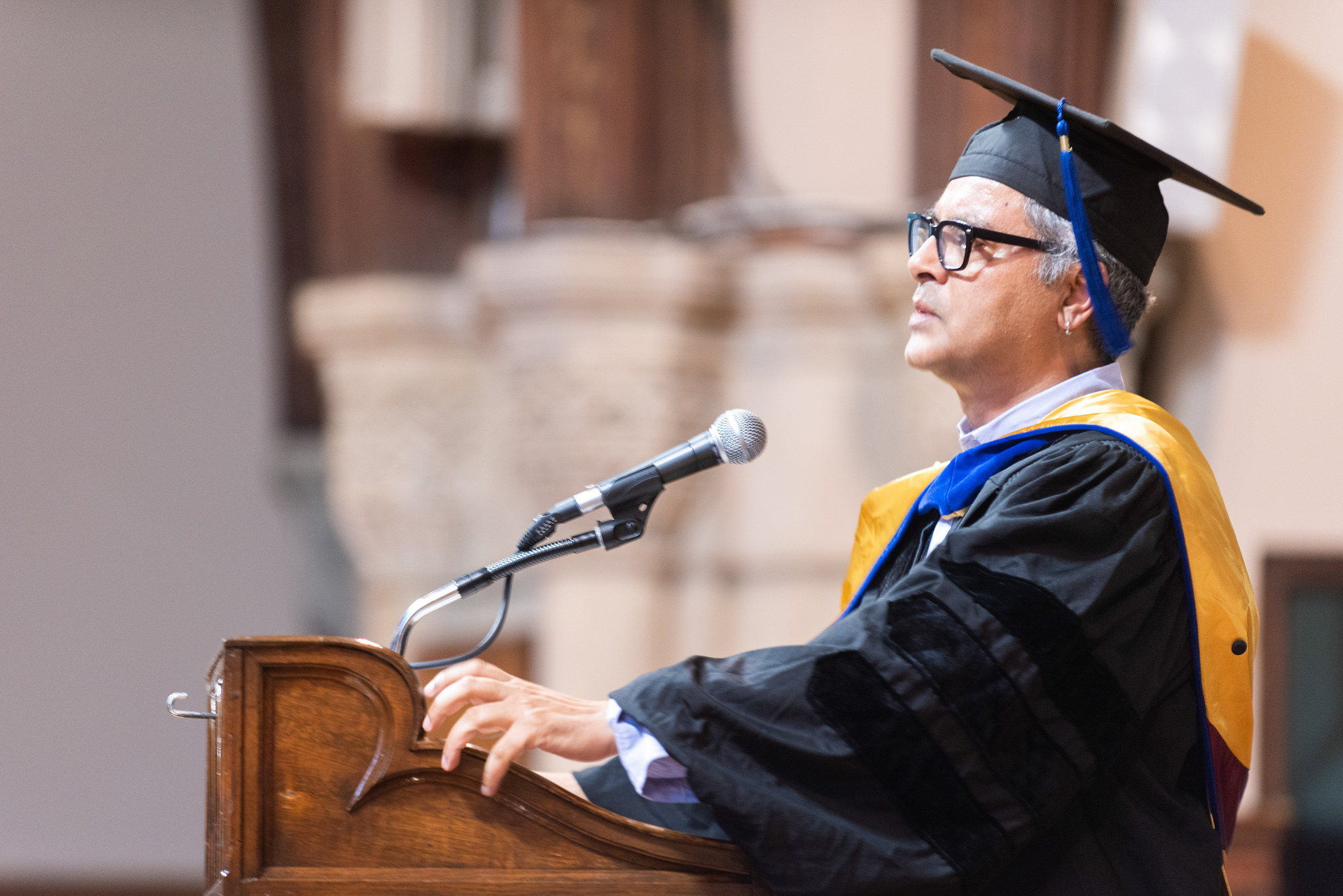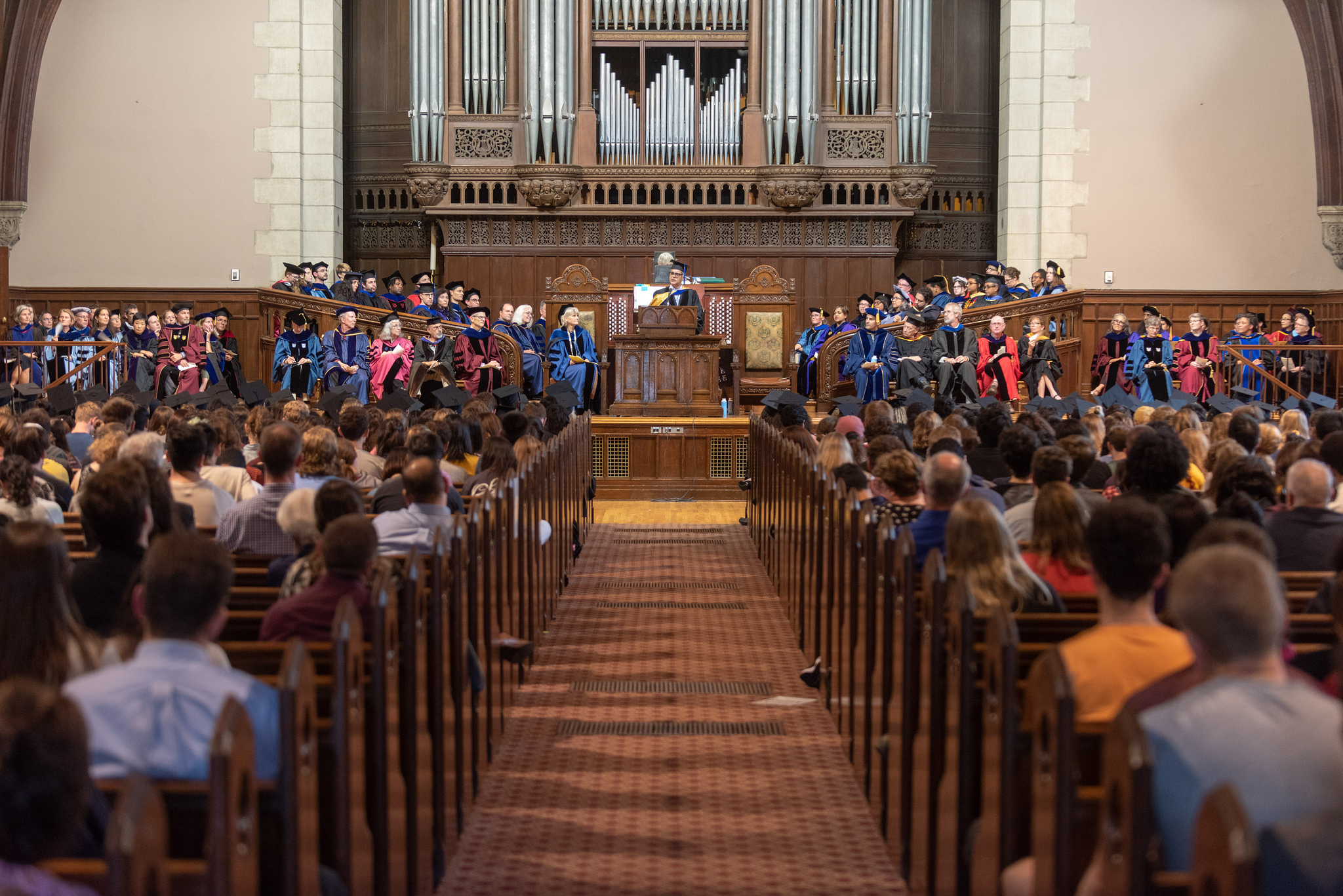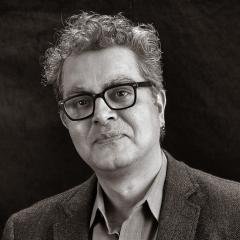You Will Not Remember All of This
September 12, 2018
Thank you. I’m honored to be speaking to you today.
Over the years I have spoken to countless students at Vassar but never in a Hogwarts outfit. Thank you, President Bradley, for the opportunity.

Talking of Hogwarts, a fine student of mine from last year, a sophomore now, wrote to say that he couldn’t make it to the ceremony today because of Quidditch practice. May you spot and catch the golden snitch, my friend! Which is all to say, I’m happy about all of you being here today but I’m not getting too excited. I mean, I know that the entire Quidditch team is missing from this gathering.
Which is fine because you will not remember all of this. I will not remember all of this. As the joke goes: Not only is my short-term memory horrible, but so too is my short-term memory.
I wrote to twenty of my writing students who had graduated over the past decade. What do you remember of the convocations you attended, either during your first-year or later when you were in your final year at Vassar?

All twenty, every one of them, remembered how hot it was in the chapel. Here’s Lucas Mann, Vassar ‘08, one of the best young nonfiction writers in the country today: ‘I mostly remember how hot it was. I was sitting next to my freshman year roommate, very hungover and very hot and dehydrated. I felt terrified and fraudulent, like the whole college thing was very soon going to become real and I was woefully unprepared.’ Here’s Emilia Petrarca, Vassar ‘14, now a wonderful writer at the New York Magazine, ‘I did attend freshman convocation. I remember it was hot and disturbingly humid. So much so, I couldn’t pay much attention to the speaker. I do not remember a thing that anyone said at all.’
Only one of the twenty remembered who their convocation speaker was. Which, if you forget the heat and consider this point for a moment, pretty much lets me off the hook.
I am sure all the convocation speakers were wonderful but I have great sympathy for the students sitting in the pews. Let me tell you why.
Many of you, no doubt, have heard about the ‘invisible gorilla experiment.’ Here’s a description in the New York Times:
Subjects are shown a video, about a minute long, of two teams, one in white shirts, the other in black shirts, moving around and passing basketballs to one another. They are asked to count the number of aerial and bounce passes made by the team wearing white, a seemingly simple task. Halfway through the video, a woman wearing a full-body gorilla suit walks slowly to the middle of the screen, pounds her chest, and then walks out of the frame. If you are just watching the video, it’s the most obvious thing in the world. But when asked to count the passes, about half the people miss it.
This experiment…is a striking demonstration of the zero-sum nature of attention. When you direct your mental spotlight to the basketball passes, it leaves the rest of the world in darkness. Even when you are looking straight at the gorilla (and other experiments find that people who miss it often have their eyes fully on it) you frequently don’t see it, because it’s not what you’re looking for.
Put simply, our students from those years ago remember the heat and little else because, new on campus, often uneasy, subjected to countless speeches, and focused on finding comfort, on wanting to simply breathe, they filtered out everything except whether the air felt pleasant. I understand that. And yet I would be failing in my duty as a teacher if I didn’t also urge you, after you have told yourself to relax, loosened your shoulder, taken a couple of deep breaths, after you have tried to find a little calm space for yourself, if I didn’t ask you to consider what you will remember of this time, of this moment, here and now.
In my classes I teach stories that are about the work that memory does. In Alice Munro’s ‘The Bear Came Over the Mountain,’ a woman named Fiona is suffering from dementia. She is losing her memory even as the paragraphs progress, and the odd and brilliant thing is that as Fiona forgets, the story remembers more and more, and it is telling us, the readers, about Fiona’s past and her husband’s. In another story, this one by Tobias Wolff entitled ‘The Bullet in the Brain’, a dyspeptic critic named Anders is shot by a bank robber. The bullet’s appearance in the brain sets off a memory of a distant summer afternoon. We will be told of that memory when we reach the story’s end. In the meantime, the trick that the storyteller pulls off is that he tells us what Anders did not remember. For instance: ‘He did not remember Professor Josephs telling his class how Athenian prisoners in Sicily had been released if they could recite Aeschylus, and then reciting Aeschylus himself, right there, in the Greek. Anders did not remember how his eyes had burned at those sounds.’ Or, in the opening lines of Milan Kundera’s The Book of Laughter and Forgetting, the story of how a politician was airbrushed out of a famous photograph, and therefore out of history, and all that remained of him in the public or collective memory was the fur hat that he had put on the great leader’s bald head because it had started snowing. We read the interviews conducted by the recent Nobel laureate Svetlana Alexievich because the feeling that is inescapable is that we are listening to voices remembering, clinging on to, memories that the authoritarian state had almost disallowed. How do you remember an experience that was brushed under that heavy carpet called official history?
I’m interested in teaching my students, and in teaching myself, how it is that we remember. Let’s return for a moment to the invisible gorilla experiment. If we take its point, it suggests that not only do we see but we also remember only that which we focus on. I was in Poughkeepsie one winter morning when I received word from India that my mother was dying. I took the first plane home. My mother had died by the time I reached. I saw her body on the first floor of our house and then I went up to her room. I was alone. My mother’s walking stick was leaning against the wall. Her saris, whose smell would have been familiar to me, hung in the cupboard. Next to the bed were the two pairs of her white sneakers equipped with Velcro straps for her arthritic hands. Standing in front of the bathroom sink, it occurred to me that the bar of Pears soap in the blue plastic dish was the one that Ma had put there just before she died. These items appeared to me like memorials that would soon disappear, and I carefully noted them down in a small notebook, which I try to carry with me at all times. After only a few days, I began to wonder whether what I remembered of my mother’s death was not my memory but what I had only written about it. The event replaced by writing, but if I didn’t write, who knows, there would be nothing but the oblivion of death and lost memories.
I write things down because I believe we forget everything, even what is most precious to us. My two children are the two beings I cherish the most in the world. Last year, my son Rahul, he was seven at that time, said to me one night, ‘I’m a failure, Dad. I can’t do something as simple as falling asleep.’ I thought that was funny, even adorable, and I remember it only because I wrote it down.
I want to pause for two minutes now. I want you to write down on the index card you have been given anything you want to remember. If you are a first-year student, perhaps you could write what you would like to remember when you come back here for your Senior convocation. If you are a Senior, and are going to graduate at the end of the year, is there anything you want to remember during graduation or for that matter your first reunion? If nothing else, do you want to remember who is sitting next to you? Or what you need to do when you return to your room? Or how hot it is in here? My colleagues: do you need to remember to buy milk from Adams on your way home tonight? Is there a project to be completed by this time next year? Or, away from this scene, a tender thought that has surfaced now and then during the past day or two?
I am asking you all to do this exercise—to write on the card and to keep it with you—because memories are not just about the past: they are also one of the ways in which we talk to our future self. I’ll give you a moment now to finish writing.
I remember my first year at a college in Delhi. I mostly remember how bad my teachers were. On way to the university the bus I took wound its way past the Nigambodh Ghat, the cremation ghat for the dead, where I would sometimes see a father carrying in his arms a bundle wrapped in white. Nothing that I was being taught in class was in any way linked to the life and the death I witnessed on the street every day. If my teachers were wretched, I was no better. I was aimless, wanting to be a writer, but not writing. After a while, I even stopped going to classes. I would catch the bus in the morning but get down halfway to the university at a government library where I would read books by Indian writers writing in English. A boy I had known, someone who lived on my own street, had become a drug addict. One night he and his friends tried to rob a jewelry store and he was shot in the face. I would later put that boy in my first novel but what I remember around that time in college is my struggle to find words. Words were difficult to come by, they lacked precision, and my understanding of the world and my place in it was unformed. But in time words came to me and this is because I had never stopped reading or trying to write. I have a vivid memory of reading George Orwell’s essay ‘Why I Write,’ and essays by Indian writers like Khushwant Singh and R.K. Narayan, and then trying to use words to describe the sky, the look in the eyes of the vendors on the street, an empty bus late at night taking me from one part of the city to another.
It’s been a great privilege for me to teach here at Vassar. I had taught at other places before I got here and I can say without hesitation that the relationships I have formed with my Vassar students have been special. For many years now the mantra I offer to them is a simple one: Write every day and walk every day. Not a lot, just 150 words, and mindful walking on this beautiful campus. It has worked for me and for more than a few students. I often go the Vassar Farm, a small pencil and an index card sitting in my pocket, and I go over in my mind whatever piece of writing I’ve been working on. A few of the ideas I have shared with you today came to me on such walks.
How much more mature and thoughtful and accomplished are my students than I was at their age! Even as I asked the twenty I mentioned before to tell me about their memories, I asked them to reflect a bit on the difference between their first year convocation and their final year here.
I’m very proud of my student Kelly Stout, Vassar ’10, who got a byline at the New Yorker magazine before I did. I want to end by reading the account she sent me of the convocation speech and what happened during the four years that followed—I’m doing this because what Kelly wants you to find at Vassar is something I want you to remember:
I’m sorry to report that I don’t remember any of it. I do remember that throughout orientation, I’d been hooking up with a guy who wore tapered pants, and during the speech, he kept poking me in the stomach. Anyway, the relationship didn’t last…When I was a freshman, I did not know, since I could not see the future, that on my first day at Vassar, I’d meet the women who became my best friends in the universe, or that I’d meet the man who would become my husband right around the last. I know this does not count as advice. ‘See if you can meet friends that will stay by you forever and meet a life partner if you’ve got time’ is pretty unhelpful. But I say this because I think telling my 18-year-old self this would allay the fundamental fear I felt as I sat at convocation: Would I find community? I wish I could tell that girl: Worry less about what shape your life is going to take. Focus on becoming curious instead. For-real curious, not brochure curious. You know what I mean—like, don’t be that kind of fake curious that people are displaying in photos of them holding a beaker and wearing protective eyewear. Learn to be the kind of person who is interested in things you think don’t apply to you. It’s going to take actual work and practice to be this, and people like Professor Kumar, your best friends, that guy you’ll marry, and even the dude in the tapered pants will help you do this. Take them up on the help they offer. That’s how you find community.
I could end there. But I need to tell you that if Kelly were still in my class, I’d have liked her to sit down and edit that piece of writing. We would have circled around and come down to what was most important in what she was saying and how to say it better. I think the thing she remembers the most is that she found friends here—but what I’m most happy about, what I choose to see, what I find most relevant, is that she found the words to describe what happened to her at Vassar. That is what is most gratifying for me—because what I remember, and what brought tears to my eyes when I was talking to Kelly’s mother on the day of her graduation so many years ago, was that when Kelly would finish reading her pieces aloud in class, we were always left speechless.
Thank you.
Photos: Karl Rabe/Vassar College
About the Speaker

Amitava Kumar, professor of English on the Helen D. Lockwood chair, received his PhD from the University of Minnesota. He is an author, most recently of a novel Immigrant, Montana, and journalist. In 2016, Kumar was awarded a Guggenheim Fellowship (general nonfiction) as well as a Ford Fellowship in Literature from United States Artists.